Probiotics for induction of remission in Crohn's disease
- PMID: 32678465
- PMCID: PMC7389339
- DOI: 10.1002/14651858.CD006634.pub3
Probiotics for induction of remission in Crohn's disease
Abstract
Background: Crohn's disease (CD) is a chronic inflammatory disorder of the gastrointestinal tract, in which the pathogenesis is believed to be partly influenced by the gut microbiome. Probiotics can be used to manipulate the microbiome and have therefore been considered as a potential therapy for CD. There is some evidence that probiotics benefit other gastrointestinal conditions, such as irritable bowel syndrome and ulcerative colitis, but their efficacy in CD is unclear. This is the first update of a Cochrane Review previously published in 2008.
Objectives: To assess the efficacy and safety of probiotics for the induction of remission in CD.
Search methods: The following electronic databases were searched: MEDLINE (from inception to 6 July 2020), Embase (from inception to 6 July 2020), the Cochrane Central Register of Controlled Trials (CENTRAL), The Cochrane IBD Review Group Specialised Trials Register, World Health Organization (WHO) International Clinical Trials Registry, and ClinicalTrials.gov.
Selection criteria: Randomised controlled trials (RCTs) that compared probiotics with placebo or any other non-probiotic intervention for the induction of remission in CD were eligible for inclusion.
Data collection and analysis: Two review authors independently extracted data and assessed the methodological quality of included studies. The primary outcome was clinical remission. Risk ratios (RRs) and 95% confidence intervals (CIs) were calculated for dichotomous outcomes.
Main results: There were two studies that met criteria for inclusion. One study from Germany had 11 adult participants with mild-to-moderate CD, who were treated with a one-week course of corticosteroids and antibiotics (ciprofloxacin 500 mg twice daily and metronidazole 250 mg three times a day), followed by randomised assignment to Lactobacillus rhamnosus strain GG (two billion colony-forming units per day) or corn starch placebo. The other study from the United Kingdom (UK) had 35 adult participants with active CD (CDAI score of 150 to 450) randomised to receive a synbiotic treatment (comprised of freeze-dried Bifidobacterium longum and a commercial product) or placebo. The overall risk of bias was low in one study, whereas the other study had unclear risk of bias in relation to random sequence generation, allocation concealment, and blinding. There was no evidence of a difference between the use of probiotics and placebo for the induction of remission in CD (RR 1.06; 95% CI 0.65 to 1.71; 2 studies, 46 participants) after six months. There was no difference in adverse events between probiotics and placebo (RR 2.55; 95% CI 0.11 to 58.60; 2 studies, 46 participants). The evidence for both outcomes was of very low certainty due to risk of bias and imprecision.
Authors' conclusions: The available evidence is very uncertain about the efficacy or safety of probiotics, when compared with placebo, for induction of remission in Crohn's disease. There is a lack of well-designed RCTs in this area and further research is needed.
Copyright © 2020 The Cochrane Collaboration. Published by John Wiley & Sons, Ltd.
Conflict of interest statement
Berkeley N Limketkai has no known declarations of interest to declare.
Anthony K Akobeng has no known declarations of interest to declare.
Morris Gordon Since August 2016, I have received travel fees to attend international scientific and training meetings from Pharma companies. These grants included no honoraria, inducement, advisory role or any other relationship and were restricted to the travel and meeting related costs of attending such meetings. These include: DDW (Digestive Disease Week) May 2017, World Congress of Gastroenterology October 2017, DDW May 2018, Advances in IBD December 2018, DDW May 2019. The companies include: Biogaia (2017‐19), Ferring (2018), Allergan (2017), synergy (bankrupt ‐ 2018) and Tillots (2017‐19).None of these companies have had any involvement in any works completed by me and I have never had any payments for any other activites for them, as confirmed below. From these date onwards, I have made a personal undertaking to take no further funds from any pharmaceutical or formula company in any form for travel or other related activities. This is to lift the limitations such funding has on my ability to act as a first and corresponding author on reviews, in line with the Cochrane policies on such matters and is reported in line with these policies. These current declarations will expire over the next 3 years and this statement updated regularly to reflect this.
Akinlolu Adedayo Adepoju has no known declarations of interest to declare.
Figures
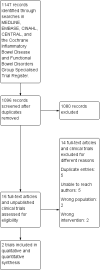
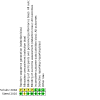
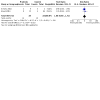
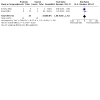
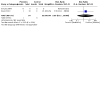
Update of
-
Probiotics for induction of remission in Crohn's disease.Cochrane Database Syst Rev. 2008 Jul 16;2008(3):CD006634. doi: 10.1002/14651858.CD006634.pub2. Cochrane Database Syst Rev. 2008. Update in: Cochrane Database Syst Rev. 2020 Jul 17;7:CD006634. doi: 10.1002/14651858.CD006634.pub3. PMID: 18646162 Free PMC article. Updated.
References
References to studies included in this review
Schultz 2004 {published data only}
Steed 2010 {published data only}
-
- Steed H, Macfarlane GT, Blackett KL, Bahrami B, Reynolds N, Walsh SV, et al. Clinical trial: the microbiological and immunological effects of synbiotic consumption - a randomized double-blind placebo-controlled study in active Crohn's disease. Alimentary Pharmacology & Therapeutics 2010;32(7):872-83. [PMID: ] - PubMed
References to studies excluded from this review
ACTRN12614000465651 {published data only}
-
- ACTRN12614000465651. Single centre, open label Phase 1/Phase 2 study to evaluate the safety and efficacy of Dietzia C79793-74 in moderate to severe Crohn's disease. www.anzctr.org.au/Trial/Registration/TrialReview.aspx?id=366224 (first received 30 May 2019).
Day 2012 {published data only}
-
- Day AS, Leach ST, Lemberg DA, Judd TA, Baba K, Hill RJ. The probiotic VSL#3 in children with active Crohn disease. Gastroenterology 2012;142(5):S-378.
NCT00367705 {published data only}
-
- NCT00367705. Double-blind placebo controlled trial of VSL#3 in children with Crohn's disease. clinicaltrials.gov/show/NCT00367705 (first received 30 May 2019).
NCT00374374 {published data only}
-
- NCT00374374. Treatment with Lactobacillus rhamnosus and Lactobacillus acidophilus for patients with active colonic Crohn’s disease. clinicaltrials.gov/show/NCT00374374 (first received 30 May 2019).
NCT01548014 {published data only}
-
- NCT01548014. The effect of a probiotic preparation (VSL#3) plus infliximab in children with Crohn's disease. clinicaltrials.gov/show/NCT01548014 (first received 30 May 2019).
Plein 1993 {published data only}
-
- Plein K, Hotz J. Therapeutic effects if Saccharomyces boulardii on mild residual symptoms in a stable phase of Crohn's disease with special respect to chronic diarrhoea - a pilot study. Zeitschrift für Gastroenterologie 1993;31(2):129-34. [PMID: ] - PubMed
Su 2018 {published data only}
Ye 2017 {published data only}
-
- Ye J, Wang W, Wu M, Zhang J. Suffasalarin combined with probiotics for treatment of patients with inflammatory bowel disease: effect on prognosis and inflammatory factors. World Chinese Journal of Digestology 2017;25(3):293-7.
Additional references
Butterworth 2008
Campieri 2000
-
- Campieri M, Rizzello F, Venturi A, Poggioli G, Ugolini F, Helwig U, et al. Combination of antibiotic and probiotic treatment is efficacious in prophylaxis of post-operative recurrence of Crohn's disease: a randomized controlled study vs mesalamine. Gastroenterology 2000;118:A4179.
Click 2019
-
- Click B, Regueiro M. Managing risks with biologics. Current Gastroenterology Reports 2019;21:1. - PubMed
Colombel 2010
-
- Colombel JF, Sandborn WJ, Reinisch W, Mantzaris GJ, Kornbluth A, Rachmilewitz D, et al. Infliximab, azathioprine, or combination therapy for Crohn's disease. New England Journal of Medicine 2010;362:1383-95. - PubMed
Corr 2007
Covidence [Computer program]
-
- Covidence. Version Accessed 10 January 2019. Melbourne, Australia: Veritas Health Innovation.Available at covidence.org.
Guslandi 2000
-
- Guslandi M, Mezzi G, Sorghi M, Testoni PA. Saccharomyces boulardii in maintenance treatment of Crohn's disease. Digestive Diseases and Sciences 2000;45:1462-4. - PubMed
Higgins 2017
-
- Higgins JPT, Thomas J, Chandler J, Cumpston M, Li T, Page MJ, Welch VA (editors). Cochrane Handbook for Systematic Reviews of Interventions version 5.2.0 (updated June 2017). Cochrane, 2017. Available from training.cochrane.org/handbook.
Iheozor‐Ejiofor 2020
Isolauri 2000
-
- Isolauri E, Arvola T, Sutas Y, Moilanen E, Salminen S. Probiotics in the management of atopic eczema. Clinical & Experimental Allergy 2000;30:1605-10. - PubMed
Kaur 2020
Lai 2019
Limketkai 2017
-
- Limketkai BN, Parian AM, Chen PH, Colombel JF. Treatment with biologic agents has not reduced surgeries among patients with Crohn's disease with short bowel syndrome. Clinical Gastroenterology and Hepatology 2017;15:1908-14. - PubMed
Molodecky 2012
-
- Molodecky NA, Soon IS, Rabi DM, Ghali WA, Ferris M, Chernoff G, et al. Increasing incidence and prevalenceof the inflammatory bowel diseases with time, based onsystematic review. Gastroenterology 2012;142:46–54. - PubMed
Mukherjee 2015
-
- Mukherjee S, Ramesh A. Bacteriocin-producing strains of Lactobacillus plantarum inhibit adhesion of Staphylococcus aureus to extracellular matrix: quantitative insight and implications in antibacterial therapy. Journal of Medical Microbiology 2015;64:1514-26. - PubMed
Navarro‐López 2018
-
- Navarro-López V, Ramírez-Boscá A, Ramón-Vidal D, Ruzafa-Costas B, Genovés-Martínez S, Chenoll-Cuadros E, Carrión-Gutiérrez M, Horga de la Parte J, Prieto-Merino D, Codoñer-Cortés FM. Effect of oral administration of a mixture of probiotic strains on SCORAD Index and use of topical steroids in young patients with moderate atopic dermatitis: a randomized clinical trial.. JAMA Dermatology 2018;154(1):37-43. - PMC - PubMed
Nguyen 2019
Pochapin 2000
-
- Pochapin M. The effect of probiotics on Clostridium difficile diarrhea. American Journal of Gastroenterology 2000;95(1 Suppl):S11-13. - PubMed
Review Manager [Computer program]
-
- Review Manager (RevMan 5). Version 5.4. Copenhagen, Denmark: Nordic Cochrane Centre, The Cochrane Collaboration, 2020.
Sartor 2005
-
- Sartor RB. Probiotic therapy of intestinal inflammation and infections. Current Opinion in Gastroenterology 2005;21:44-50. - PubMed
Schmidt 2019
-
- Schmidt RM, Pilmann Laursen R, Bruun S, Larnkjaer A, Mølgaard C, Michaelsen KF, Høst A. Probiotics in late infancy reduce the incidence of eczema: A randomized controlled trial.. Pediatric Allergy and Immunology 2019;30(3):335-40. - PubMed
Schünemann 2011
-
- Schünemann H, Hill S, Guyatt G, et al. The GRADE approach and Bradford Hill's criteria for causation. Journal of Epidemiology & Community Health 2011;65:392-5. - PubMed
Shanahan 2000
-
- Shanahan F. Probiotics and inflammatory bowel disease: is there a scientific rationale? Inflammatory Bowel Disease 2000;6:107-15. - PubMed
Shen 2014
-
- Shen J, Zuo ZX, Mao A. Effect of probiotics on inducing remission and maintaining therapy in ulcerative colitis, Crohn's disease, and pouchitis: meta-analysis of randomized controlled trials. Inflammatory Bowel Disease 2014;20:21-35. - PubMed
Shouval 2017
-
- Shouval DS, Rufo PA. The role of environmental factors in the pathogenesis of inflammatory bowel diseases: a review.. JAMA Pediatrics 2017;171(10):999-1005. - PubMed
Publication types
MeSH terms
Substances
Grants and funding
LinkOut - more resources
Full Text Sources
Other Literature Sources
Medical
Miscellaneous

